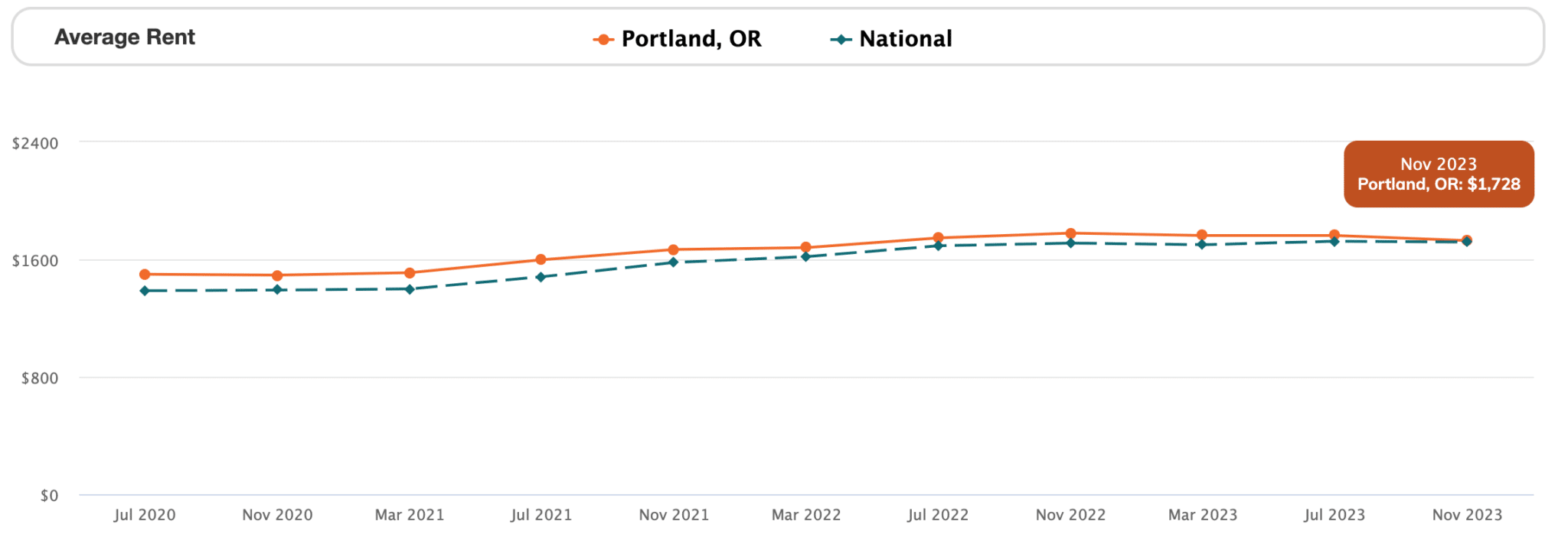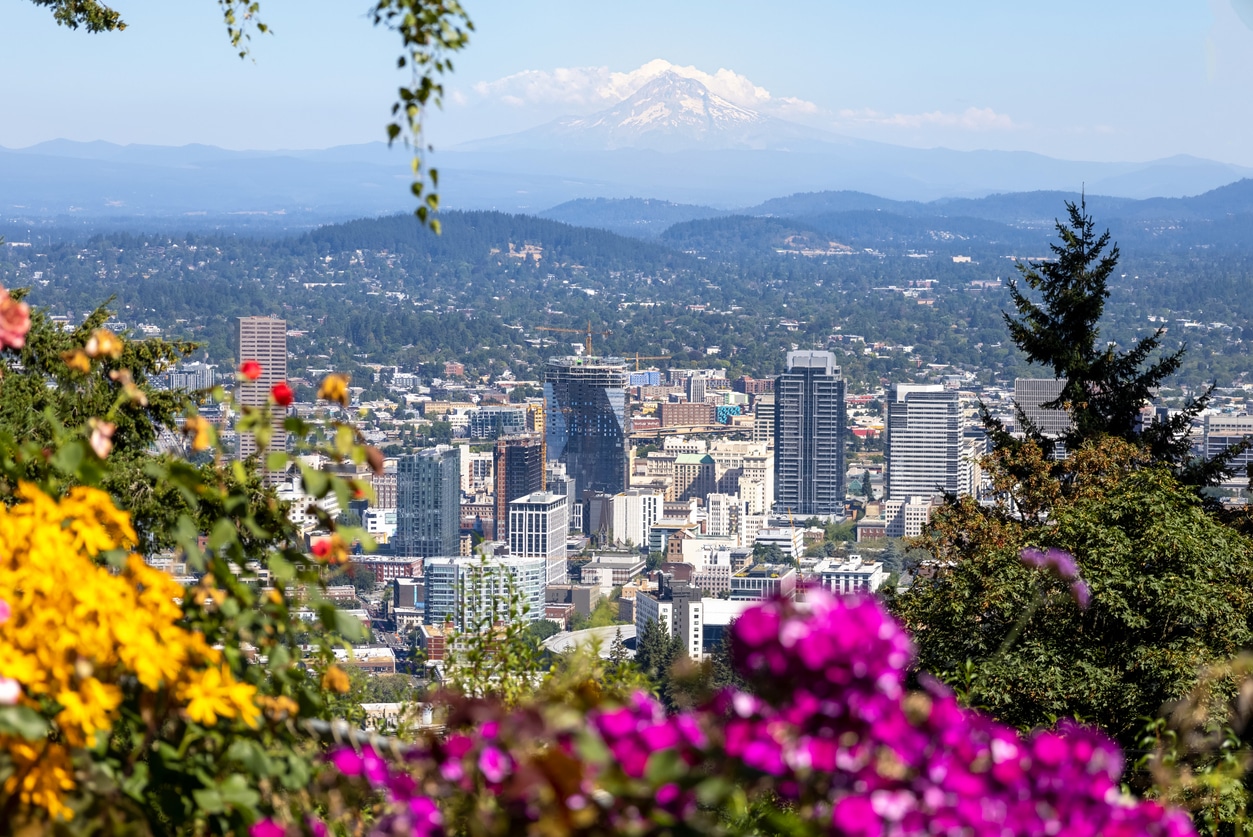Portland, Oregon Rental Law Changes into 2024

Investing in a rental property can be incredibly rewarding, bringing with it the benefits of reliable income and financial freedom. But it requires careful preparation and education to to be successful as a landlord and ensure a return on your investment. There are many factors to consider, and with this article we hope to shed light on the considerations you will encounter as you prepare to rent your property, whether it is a duplex, townhome or basement ADU.
Portland, Oregon Rental Rates have Decreased Slightly
As of November 2023, the average monthly rent for a 758 sq. ft. apartment in Portland was $1,728 – a slight decrease from 2022’s average of $1,746. As you can see on the graph below from Rentcafe.com, average rent fluctuated very little from 2022 levels over the course of the last year.

An Overview of Recent Rental Laws
Landmark 2019 Rental Law Change
Oregon legislature enacted a rent stabilization policy in 2019, capping rent increases to 7% per year plus the annual rate of inflation. With this new law, Oregon became the first state in the nation to mandate rent control. A tenant protection law was included in this measure to limit no-cause evictions, which means renters cannot be evicted without a reason, with a few important exceptions for landlords (including plans to renovate or sell the property). However, these and other qualified reasons a landlord may terminate a rental agreement, plus no-cause evictions or substantial changes in lease terms, may require the landlord to provide relocation assistance to the tenant.
2020 Fair Access for Renters and Covid-19 Provisions
The Fair Access in Renting ordinance (FAIR) was established in early 2020 to require landlords to provide equal opportunities and reduce barriers for prospective renters. These include a “first-come-first-served” rule for rental applications, priority for accessible units given to people with disabilities, limits on income-to-rent ratios, and restrictions for using credit and criminal histories to determine rental agreements. Exemptions apply to situations where the owner lives on the property, such as renting out a backyard ADU.
In April of 2020, the Governor of Oregon issued an executive order banning evictions and the termination of rental agreements for those impacted by Covid-19 who were unable to pay rent. A six-month repayment period for tenants was established later in the year after the eviction ban came to an end. In September, a temporary federal moratorium on evictions for failing to pay rent was imposed by the CDC and extended several times until it expired in October of 2021.
FAIR Act Amended in 2022
The FAIR act that went into effect in 2020 was amended to modify the screening process and significantly adjust how security deposits are handled. A helpful breakdown of the changes can be found here.
2023 Cap on Rental Rate Increases
As we predicted in last year’s article on rental rate increases, political pressure led to an eventual cap on the maximum percentage that rates will be allowed to increase in the future. On July 6, 2023, Oregon Governor Tina Kotek signed a new law into effect that limits rent rate increases to 10%. Prior to the new cap on rate increases that went into effect in July, the 2023 allowable rate limit was 14.6%. Now future rate increases will be calculated using this formula: 7% plus the Consumer Price Index (inflation rate), or 10% – whichever is lower.
Allowed Rental Rate Increases in 2024
Under Oregon’s rent stabilization law, the limit for the upcoming year is set by September 30. In accordance with the new rate cap, the allowable annual rent increase for 2024 is 10%, bringing the rate nearly equal to the 9.9% increase in 2022. As a further safeguard for renters, Landlords are allowed a single rent increase in any 12-month period.
Since 2019 when Oregon’s rent control law went into effect, the maximum rent rate increase is a limit for landlords who choose to raise their rates and not an automatic rate increase. In fact, we’d advise rental owners to succeed not through rapid rent increases, but instead by seeking out responsible renters who become reliable long-term tenants.
Helpful Rental Laws to Know
In addition to recent laws and amendments, there are fundamental rental regulations we recommend that any potential landlord become familiar with. These include:
Disclosures
There are certain disclosures that landlords are required to provide to their tenants. These are usually included in the lease or rental agreement as legal definitions naming the owner, management company and the party responsible for paying utility bills, the smoking policy, and information on smoke alarms and carbon monoxide detectors.
Non-refundable fees
When a tenant signs a new lease, the landlord is required to clearly outline specific violations that would lead to fees being deducted from a rental deposit. Common violations include property damage and late rent payments.
Tenant Rights
Oregon law provides certain protections for tenants that are important for landlords to be aware of. For example, before accessing a rental property a landlord must provide 24 hours advance notice to the tenant (except in certain emergencies). Landlords must also follow guidelines concerning how to handle property left behind by tenants and learn the special protections for renters who are victims of domestic violence as well as the housing discrimination protections known as Fair Housing rights.
Nolo provides a helpful legal encyclopedia article that explains landlord disclosure responsibilities, types of fees that are allowed, and Fair Housing compliance for renting properties in Oregon.
Resources for Portland Landlords
There are a variety of resources available to help landlords understand and navigate the laws that apply to rental properties. We’ve included some of the most helpful below.
- The Portland Housing Bureau offers a frequently updated resources for both landlords and tenants and trainings on Landlord Tenant Law. Its Rental Services Office has a helpline that you can call or email for information and technical assistance.
- The Portland Area Rental Owners’ Association holds regular meetings and provides educational webinars and up-to-date legal forms for landlords.
- The Rental Housing Alliance of Oregon offers mentoring, courses and other resources for rental property owners.
- MultifamilyNW is an organization that promotes quality rental housing through education, professional networking and industry news updates.
- Rental management software can be a great asset to landlords, especially those with multiple units. It enables you to keep track of tenant information, accounting and building maintenance, and some software will generate reports to track your profits.
Work with a Local Expert
Finally, a top sellers agent or buyers agent can provide a wealth of knowledge and recommendations for reputable property management and maintenance companies or attorneys for legal advice. Whether you are ready to buy an investment property or sell your current rental unit, we know the market and have access to opportunities that are not publicly available online. We have more than two decades of experience working with buyers and sellers in the Portland area. Call us today at 503-714-1111 or chat with the bot on this site to put our expertise to work for you.


